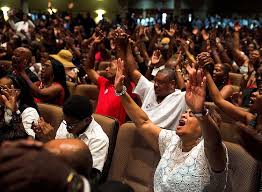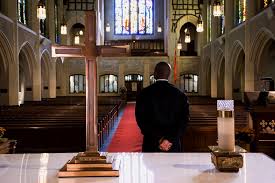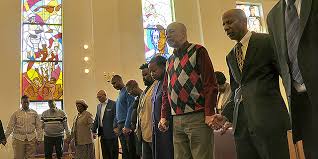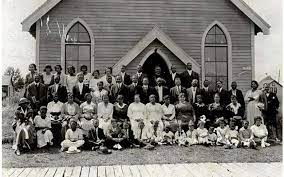Tag Archives: Black Men
Why Are Black Men No Longer Attending Church: A Black Man Offers His Thoughts
I’ll tell you, one of the most divisive statements that serve no purpose other than to disrupt Black solidarity is the old refrain that Black folks are not monolithic. This statement is one of the few that possesses the power to be simultaneously partially true and partially false. Now, I agree that Black people are not monolithic on most things; however, I also realize that there are points of agreement.
One of the most prominent points of agreement among Black men is that a relationship with God/Allah is crucial. If you are ever so privileged to have access to the private spaces that Black men go after battling a burdensome society, you will find the majority of them deep in meditation, thought, or prayer. Wise Black men understand that only our significant connection to God/Allah maintains our sanity. It is God/Allah that shelters us after we have sheltered, protected, and nurtured our wives, children, brothers, and sisters who rely on us without much of a second thought.

In many ways, it is nonsensical to believe that Black men existing in the same land that enslaved, hunted, lynched, incarcerated, marginalized, and disrespects them daily have “made it through” without the never-changing hand of a higher power. Yet, I and droves of other Black men do not attend Sunday service with much regularity.
What has driven so many Black men from church pews?
As a historian and Black Nationalist who has dedicated his entire life to the liberation and salvation of the Black nation, I know very the politico-economic strength that the church can generate; its power is unlike any other American institution. Black religious institutions gifted us with Nat Turner, Ella Baker, Bishop Henry Mcneal Turner, Malcolm X, the Rev. Dr. Martin Luther King Jr., the Rev. Dr. Johnny R. Heckard, and Fred Shuttlesworth. Each of the above individuals used some Black religious institution to gather, organize, and guide our people toward elusive freedom. During even the toughest of times, Black men have turned to the praise house searching for like-minded individuals and their God.
Although I am confident that Black Pastors/Preachers will take significant issue with the following assertion, however, I fervently believe that what has changed in the relationship between Black Men and the Black Church is the lack of usefulness of the sermons emanating from the pulpit.
One does not need to search far to find Black men who will tell you that the message delivered by many of the most high profile Preachers have no relevance to their current station in life. It appears that the training Black clergy receive from White theological schools has rendered them mainly useless to Black folks in desperate need of tangible gains that are only accessible through large-scale social movements and a steep increase in knowledge. If I did not know any better, I would believe that the Black clergy is willing to turn a blind eye toward earthly suffering as long as their poor and working-class congregants make it up to yonder to see their Lord.
Many Black men dismiss any engagement with the Black Church with a quip of “it doesn’t seem to have the power that it used to back in the day.”
According to the Pew Research Center, these men have much company in their pessimistic view of sermonic content in today’s Black Church. A Pew poll reveals that 62% of Black folks consider it important that Black Pastors/Preachers address the politico-economic and social issues that impact them and their loved ones. A significant 23% of Black respondents felt addressing political and social issues essential to the Black Clergy’s duties.
Ironically, a Black Church that historically taught patriarchy and racial solidarity against enemies is now telling Black Men that if only they lived correctly and sought refuge in the Lord, their problems would disappear. Such a message is a deliberate misapplication of the Gospel and popular musical expressions such as the song, “The Battle’s Not Yours, It’s the Lords.”

Life’s experiences have taught Black men that this earthly battle is one that they have to fight; however, they will accept otherworldly assistance if offered. Until Black Pastors/Preachers abandon emotional theatrics designed to excite congregants momentarily and return to that old-time religion of rallying Black folks around political goals, economic solidarity, and social restraint Black men will never return to the praise house in significant numbers. Without the above alteration, there isn’t much of a reason to attend Sunday Service. No reason at all!!!!!
MRCi discussions occur every Thursday @ 7:30 (EST) – 6:30 (CST). Click on the link below to join our intellectual community.
Join us as we discuss pressing matters facing and impacting Black Men and Black America.
Just in case you can not get the link to work, use the information to join the Zoom session.
Meeting ID: 353 334 8869
Passcode: 1YF4BG
James Thomas Jones III, Ph.D.
©Manhood, Race, and Culture, 2021
THE CASE FOR AFRICAN-AMERICAN MALE STUDIES
This is a Manhood, Race, and Culture Interactive (MRCi) discussion. The panelists are discussing if there is a need for African-American Male Studies and the plight of Black men.
MRCi discussions occur every Thursday @ 7:30 (EST) – 6:30 (CST). Click on the link below to join our intellectual community.
Join us as we discuss pressing matters facing and impacting Black Men and Black America.
Just in case you can not get the link to work, use the information to join the Zoom session.
Meeting ID: 353 334 8869
Passcode: 1YF4BG
Are Black Men and Black males (of all ages) engaged in a Civil War?: The Case of Excusing the Issuing of some “Act Right”
On January 15, 1991, famed rap group Gang Starr released their legendary album, Step in the Arena. It is no overstatement to say that Guru and DJ Premier’s contribution to Hip-Hop culture still reverberates at the present moment. Some music outlets went so far as to call the album “the greatest Hip-Hop album of all time.”
For our purposes, the most memorable song on this classic recording is titled Just to Get a Rep; Guru draws mental pictures of individuals seeking to gain a street reputation through various criminal activities and underhanded means.
After watching one of the most vicious yet deserved whippings in recent memory, this particular song came to mind. At a Memphis, Tennessee, mall, cell phone footage captured a pair of young African-American males harassing a self-described “grown-ass man.” As the video unfolds, the “grown-ass man” attempts to ignore continuing harassment from an African-American male who repeatedly informs all within hearing distance that he is “Piru,” a statement highlighting his gang affiliation. This Black male also notifies everyone of his intention to get a rep by beating down the “grown-ass man.”
This Black youth soon learned that it is unwise to push a “grown-ass man” past a certain point. As shown in the video footage, the lesson doled out by the “grown-ass man” onto this lost young African-American male was, in a word, epic.
After viewing the bountiful amounts of “act right” delivered to this youngster, my mind wondered what does it mean when Black youth challenge men who traditionally would have served as their mentors as they attempted to reach manhood status. The video offers a most unfortunate downward spiral of the relationships between “grown-ass men” and the youngsters who aspire to take their place. Unbeknownst to far too many rudderless Black males, the roadmap they are using to arrive at manhood is warped, illogical, and non-sensical. In many ways, this young man and thousands of others have no idea how to make the enormous leap from being a Black male to becoming a Black man; trust me when I say that I know far too many retirees who never made this transition. Unbeknownst to so many of my race, being a male and a man are two very different things.

Anyone with even a passing interest in saving Black males from the snares and traps that capture so many of them daily must ask themselves the following question. Where do these young Black males learn life philosophies and behaviors that serve neither them nor their community in the short or long term? One does not need to search far to find Black men who can attest to some form of intensely negative interaction with Black males of varying ages who believe that hyper-aggressiveness, disorderly conduct, and promiscuity are synonymous with manhood.
In this space, I have frequently mentioned a civil war occurring among different classes of Blacks. I must amend that statement. We must settle a dormant conflict between Black men and Black males before Black America can move forward. Of course, those Black males who are little more than irresponsible boys in adult bodies belong to the latter group.
While most of my counterparts eagerly rush forward to chastise Black women who refuse to take the necessary actions to regulate the behaviors of Black girls in adult bodies, they rarely address Black males. Many of them are willing participants in behavior that sits at the core of Black dysfunctionality. This hypocrisy guarantees that succeeding generations will be socialized to continue one of Black America’s most unfortunate traditions, hyper-masculinity, and disorderly conduct from Black males toward all that they encounter. At the present moment, it is difficult to argue against the assertion that for far too many Black males, the more vicious the behavior, the better.
I will tell you the truth. A part of me cringes at the sight of Black men beating down Black males, as recorded in the video mentioned above. However, a weary part of me viewed the corrective action that the “grown-ass man” in the footage handed out to the young Black male as a necessary evil to bring back some semblance of decency to Black America. We used to term such conflict as a person receiving “some act right.”
In the end, I guess that we can excuse the doling out of some “act right” because desperate times require desperate measures. And these are certainly desperate times.
James Thomas Jones III, Ph.D.
©Manhood, Race, and Culture, 2021
What a Black Man Should be and Ought to do: A MRCi Panel Discussion
I am sure that I do not need to tell you that the issue of Race continues to serve as one of the most divisive factors in America. If it can be stated that racial matters are a divisive issue within the nation, it makes sense that it would be problematic within the Black community. So, much of the in-fighting occurring within our community revolves around the issue of Black men and their general failings to be leaders within our community and a suitable provider and head of household. These matters raise the question of “What a Black Man Should be and Ought to do.” The Manhood, Race, and Culture interactive intellectual community took this issue on during a recent discussion. I hope that you find it worthwhile.
Please enjoy the two-part discussion pinned below.

